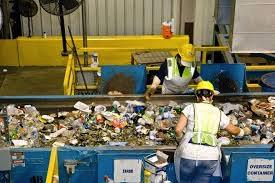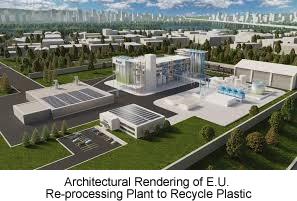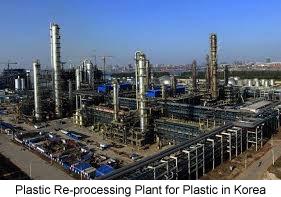 Recycling of plastic especially from egg cartons is appropriately a chicken and egg situation. It is necessary to have an efficient and comprehensive collection system that is required to supply the plants equipped for either physical or chemical processing. In establishing a technically and financially viable program the question is posed as to which component comes first? Companies must invest heavily in reprocessing facilities often for a specific class of plastic. This requires high and consistent throughput to attain a satisfactory financial return, presuming efficient collection, accumulation, sorting and transport of waste.
Recycling of plastic especially from egg cartons is appropriately a chicken and egg situation. It is necessary to have an efficient and comprehensive collection system that is required to supply the plants equipped for either physical or chemical processing. In establishing a technically and financially viable program the question is posed as to which component comes first? Companies must invest heavily in reprocessing facilities often for a specific class of plastic. This requires high and consistent throughput to attain a satisfactory financial return, presuming efficient collection, accumulation, sorting and transport of waste.
Effective collection presumes that there is a destination for the material that is collected from consumers and then accumulated and conveyed to a plant. The situation in Japan was clearly described by Katsumori Matsuoka in the October 18th edition of Chemical and Engineering News. Japan prides itself on “recycling” 85 percent of plastic containers. This does not mean that material is effectively processed after collection. It is a matter of record that Japan shipped up to 800,000 tons of waste plastic to China annually before 2017. In this year China imposed a ban on importation of waste plastic based on environmental degradation. Plants in China were burning plastic to generate power or to dispose of the material resulting in atmospheric pollution. A high proportion of the plastic shipped from developed nations was consigned to landfills creating a problem of persistence.
 The shock of banning imports by China forced Japan and other industrialized nations to reassess both the technical and financial feasibility of recycling. The Government of Japan passed the Act on Promotion of Resource Circulation for Plastics in June 2021. The law contains mostly stick and little carrot. Major retailers and users of plastic products are obliged to incorporate increasing proportions of recycled plastic to a level of 60 percent by 2030. In addition charges are imposed for plastic items to cover the costs of collection, transport and recycling. Public opinion is also forcing food manufacturers and major companies to incorporate recycling in their ESG programs, a trend that is evident in most industrialized nations.
The shock of banning imports by China forced Japan and other industrialized nations to reassess both the technical and financial feasibility of recycling. The Government of Japan passed the Act on Promotion of Resource Circulation for Plastics in June 2021. The law contains mostly stick and little carrot. Major retailers and users of plastic products are obliged to incorporate increasing proportions of recycled plastic to a level of 60 percent by 2030. In addition charges are imposed for plastic items to cover the costs of collection, transport and recycling. Public opinion is also forcing food manufacturers and major companies to incorporate recycling in their ESG programs, a trend that is evident in most industrialized nations.
Supermarkets in Japan are obliged to receive and store washed plastic trays and containers returned by consumers. Citizens of the Nation are recognized for their sense of conformity and willingness to participate in regional and national initiatives that are viewed as beneficial to society. There is a high level of planning and organization in collection of waste plastic. In Metropolitan Tokyo, waste that can be safely burned is collected each Monday. Paper, glass containers and aluminum cans are collected every other Tuesday and designated days are assigned for polyethylene terephthalate (PET) bottles.
Given the highly efficient system of collection, and the need to develop alternatives to shipping waste to China, large chemical companies applied existing technology to recycling. Re-processing plants already in operation in the E.U. served as a model. Teijin a manufacturer of plastics will apply depolymerization technology to process PET. The company is building on their experience gained in China where it operated a joint-venture processing plant in cooperation with local partners before the import ban was imposed.
 Polystyrene is widely used for packaging of food and is suitable to be degraded to extremely pure styrene that can be incorporated into new packaging in combination with virgin plastic. PS Japan is erecting plant with an initial capacity of 1,000 tons per year in cooperation with Toshiba Plant Systems and Services. The plant under construction will be commissioned in December. If successful as anticipated, PS Japan will erect a larger plant to process polystyrene for parent company Asahi Kasei a major producer of packaging.
Polystyrene is widely used for packaging of food and is suitable to be degraded to extremely pure styrene that can be incorporated into new packaging in combination with virgin plastic. PS Japan is erecting plant with an initial capacity of 1,000 tons per year in cooperation with Toshiba Plant Systems and Services. The plant under construction will be commissioned in December. If successful as anticipated, PS Japan will erect a larger plant to process polystyrene for parent company Asahi Kasei a major producer of packaging.
Toshiba Plant Systems and Services established a polystyrene recycling plant in 2001 but was obliged to close the facility in 2005 because it was more profitable to ship waste plastic to China. Now with the need to process polystyrene within Japan, financial viability is assured, encouraging the company to invest in a large plant that will be operational in 2024. Industry observers anticipate processing 2.5 to 3 million tons annually replacing virgin plastic and obviating the need for either burning or especially in the case of Japan, establishing landfills. Space is at a premium in a nation of 126 million where less than 25 percent of the land area can be used for farming, industry, habitation and recreation.
Pressures in a nation such as Japan are paralleled in most industrialized nations. Currently in the U.S. ExxonMobil is planning to process up to 30,000 metric tons of waste per year into a number of feed stock products. Dow and Chevron-Phillips Chemical have established consortia to apply pyrolysis to degrade mixed plastic waste into olefins and polyolefin plastics. Eventually, Exxon will establish a plant applying chemical processes to convert 500,000 tons of plastic waste by 2026. Similar installations are planned for Canada, the Netherlands and Singapore.
Unlike Japan, it appears that U.S. processors are taking the initiative to plan and erect re-processing plants but will rely on strategic alliances with companies that are capable of collecting, accumulating and transporting plastic waste. The concept of recycling in a nation where consumers are content to dump containers and to object to restrictions will require a high level of both inducement and training. As a nation we behave as solitary wasps compared to Japan where the public function like bees working for the communal good.
Recycling of plastics and specifically polystyrene packaging will require simultaneous development of collection and processing. In the short term there will be no positive financial return from a chain extending from consumer to supplier of recycled feedstock unless there are pricing incentives to use re-processed plastic. Recycling will have to be supported by consumer deposits or by federal grants or their combination. The obvious concern is that petrochemical companies will establish plants that cease production after a few years due to inadequate raw material as occurred in Japan prior to losing China as a receiving nation. We may have to be guided by experience in the E.U. which appears to be more advanced than the U.S., again based on consumer concerns over environmental issues and a collective desire for sustainability supported by government initiatives and empowering legislation.